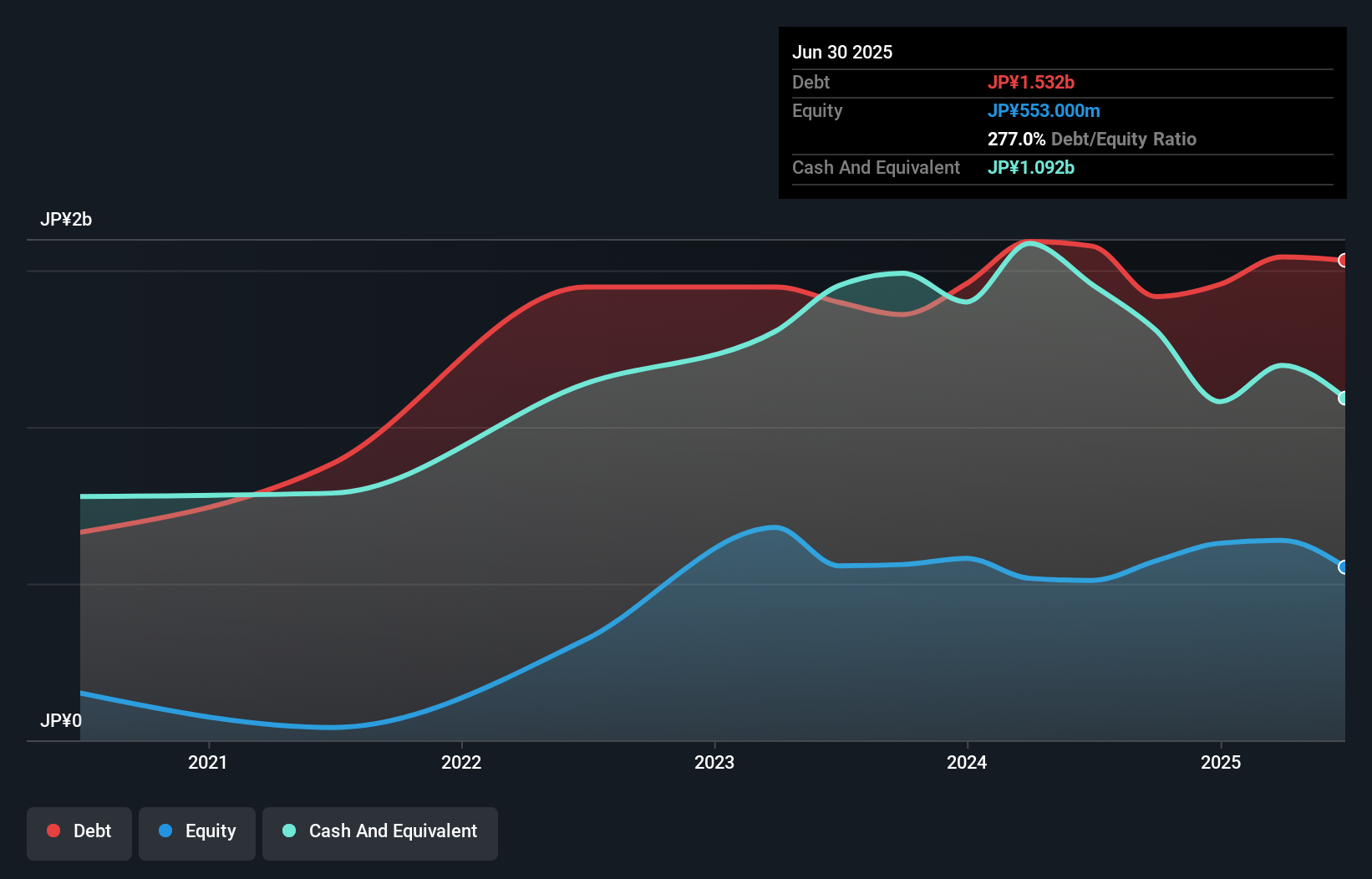Howard Marks put it nicely when he said that, rather than worrying about share price volatility, 'The possibility of permanent loss is the risk I worry about... and every practical investor I know worries about.' When we think about how risky a company is, we always like to look at its use of debt, since debt overload can lead to ruin. Importantly, airCloset, Inc. (TSE:9557) does carry debt. But the more important question is: how much risk is that debt creating?
What Risk Does Debt Bring?
Debt and other liabilities become risky for a business when it cannot easily fulfill those obligations, either with free cash flow or by raising capital at an attractive price. If things get really bad, the lenders can take control of the business. However, a more usual (but still expensive) situation is where a company must dilute shareholders at a cheap share price simply to get debt under control. Having said that, the most common situation is where a company manages its debt reasonably well - and to its own advantage. The first step when considering a company's debt levels is to consider its cash and debt together.
What Is airCloset's Debt?
The chart below, which you can click on for greater detail, shows that airCloset had JP¥1.53b in debt in June 2025; about the same as the year before. However, because it has a cash reserve of JP¥1.09b, its net debt is less, at about JP¥440.0m.

How Strong Is airCloset's Balance Sheet?
We can see from the most recent balance sheet that airCloset had liabilities of JP¥1.62b falling due within a year, and liabilities of JP¥582.0m due beyond that. On the other hand, it had cash of JP¥1.09b and JP¥356.0m worth of receivables due within a year. So it has liabilities totalling JP¥751.0m more than its cash and near-term receivables, combined.
This deficit isn't so bad because airCloset is worth JP¥2.46b, and thus could probably raise enough capital to shore up its balance sheet, if the need arose. But it's clear that we should definitely closely examine whether it can manage its debt without dilution.
Check out our latest analysis for airCloset
We use two main ratios to inform us about debt levels relative to earnings. The first is net debt divided by earnings before interest, tax, depreciation, and amortization (EBITDA), while the second is how many times its earnings before interest and tax (EBIT) covers its interest expense (or its interest cover, for short). This way, we consider both the absolute quantum of the debt, as well as the interest rates paid on it.
While airCloset's low debt to EBITDA ratio of 0.66 suggests only modest use of debt, the fact that EBIT only covered the interest expense by 6.0 times last year does give us pause. So we'd recommend keeping a close eye on the impact financing costs are having on the business. Although airCloset made a loss at the EBIT level, last year, it was also good to see that it generated JP¥102m in EBIT over the last twelve months. There's no doubt that we learn most about debt from the balance sheet. But it is airCloset's earnings that will influence how the balance sheet holds up in the future. So when considering debt, it's definitely worth looking at the earnings trend. Click here for an interactive snapshot.
Finally, a business needs free cash flow to pay off debt; accounting profits just don't cut it. So it's worth checking how much of the earnings before interest and tax (EBIT) is backed by free cash flow. During the last year, airCloset burned a lot of cash. While that may be a result of expenditure for growth, it does make the debt far more risky.
Our View
airCloset's conversion of EBIT to free cash flow was a real negative on this analysis, although the other factors we considered cast it in a significantly better light. For example its net debt to EBITDA was refreshing. Taking the abovementioned factors together we do think airCloset's debt poses some risks to the business. While that debt can boost returns, we think the company has enough leverage now. When analysing debt levels, the balance sheet is the obvious place to start. However, not all investment risk resides within the balance sheet - far from it. Be aware that airCloset is showing 4 warning signs in our investment analysis , and 1 of those is potentially serious...
Of course, if you're the type of investor who prefers buying stocks without the burden of debt, then don't hesitate to discover our exclusive list of net cash growth stocks, today.
New: AI Stock Screener & Alerts
Our new AI Stock Screener scans the market every day to uncover opportunities.
• Dividend Powerhouses (3%+ Yield)
• Undervalued Small Caps with Insider Buying
• High growth Tech and AI Companies
Or build your own from over 50 metrics.
Have feedback on this article? Concerned about the content? Get in touch with us directly. Alternatively, email editorial-team (at) simplywallst.com.
This article by Simply Wall St is general in nature. We provide commentary based on historical data and analyst forecasts only using an unbiased methodology and our articles are not intended to be financial advice. It does not constitute a recommendation to buy or sell any stock, and does not take account of your objectives, or your financial situation. We aim to bring you long-term focused analysis driven by fundamental data. Note that our analysis may not factor in the latest price-sensitive company announcements or qualitative material. Simply Wall St has no position in any stocks mentioned.
About TSE:9557
airCloset
airCloset Inc. operates as a fashion technology company providing an online fashion rental platform in Japan.
Adequate balance sheet with slight risk.
Market Insights
Community Narratives



